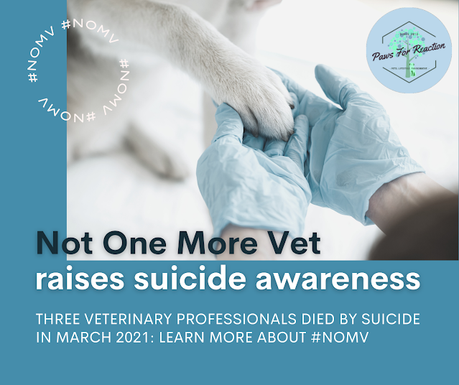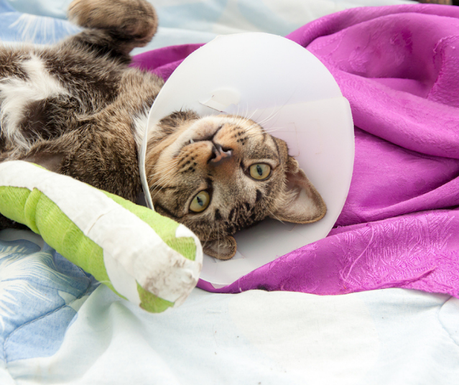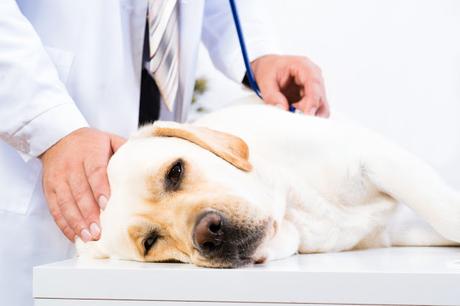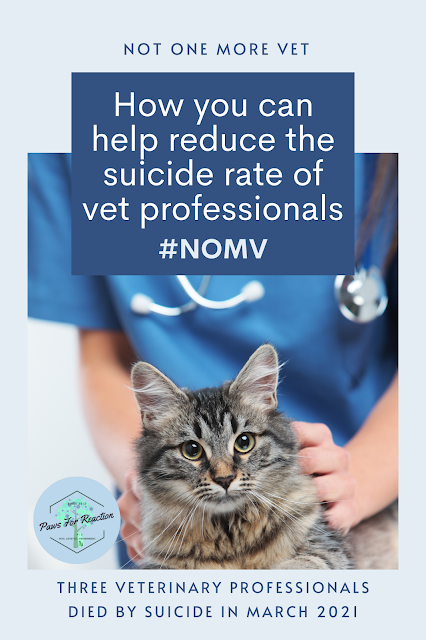How you can help #NOMV: Veterinary community and animal lovers raise awareness after three vet med professionals die by suicide

Please contact The Canada Suicide Prevention Service 24/7 by phone at 1-833-456-4566
or text them at 45645, available from 4:00 PM - 12:00 AM, EST for support. You are never alone.
If you follow animal or veterinary groups on social media or are friends with someone working in veterinary medicine, you may have seen profile pictures change to support #NOMV. This stands for Not One More Vet, and it's trending for the worst reason. In the past two weeks, three veterinarians (Josh Smith) and one veterinary technician died by suicide. I extend my most sincere sympathies to their family, friends, and colleagues. Sadly, it's a story we in the veterinary profession have heard before. According to the most recent data available in the United States, depending on gender, veterinarians are 1.6 to 2.4 times more likely to die by suicide than the general population and veterinary technicians are 2.3 to 5 times more likely. The veterinary profession has the highest rate of deaths by suicide of any profession.
During the Covid-19 pandemic, the profession has seen an increase in burnout, compassion fatigue, and mental illness. Part of this has been caused by how busy general practice and emergency clinics have become. Pet owners are home more and are discovering their pet's health problems faster and more frequently. There has also been an increase in pet ownership as pandemic puppy and kitten adoption became trendy. The phones never stop ringing, emails never stop coming in, and appointments book up months in advance.

This has made some of the population frustrated with the vet industry. They can't get an appointment and they get angry. They can't come into the building and they throw a fit. They get referred to a 24/7 emergency hospital by their general practice and they slander and bully them on Facebook. The comment I see most often that breaks my heart is "You chose this profession, you decided to work in a high-stress industry and it's your fault for not staffing your clinic properly." We chose to help animals, and a by-product of that choice is helping their owners. What we did not choose is to work through a global pandemic. We did not choose to have that pandemic affect our staffing; if a team member or their child is sick- even with a cold- they have to leave work and quarantine until their Covid-19 test results return. We did not choose for pet owners to increase animal adoption, or not prepare financially for pet emergencies. We did not choose for people to bash businesses online instead of speaking with the management of that business to find a resolution.
There have been a lot of reasons identified in studies and polls that have contributed to the high suicide rate in veterinary medicine. Some include the long work hours and what is demanded of the team during those work hours. That creates a poor work-life balance, which is known to directly contribute to declining mental health. The educational debt-to-income ratio is a big contributor, and the ratio increases every year. There is a misconception about how much money the average general practice associate veterinarian makes. I've known retail general managers who have made more than most of the veterinarians I know. Then there is the mental cost of practicing euthanasia. Pets don't pay for or have a voice when it comes to their medical care. This can be depressing for veterinary teams, especially when they have to euthanize a healthy pet, or a pet they know can recover. Vet teams, especially shelter medicine veterinary teams, have to see animals who have suffered from severe abuse and neglect. These teams chose a profession purely on the basis that they love and want to help animals, but they are human and we can't expect them to not feel the unavoidable feelings that come with situations like these.

Each and every one of us can do something to reduce the suicide rate in the veterinary profession. How can you help the veterinary professionals who love your pet?
- Most importantly BE KIND and give them the benefit of the doubt
- Have realistic expectations, especially during the pandemic. We can't be all things to everyone. Never show up without warning to a veterinary clinic expecting to be seen right away. Never expect that you will not have to pay- like any industry, you pay for the services that are rendered
- If you would scold your child for behaving the way you are behaving, then adjust your behaviour
- Stop normalizing statements like "Vets are just in it for the money." Vet med professionals are literally dying to save your pets
- Also, avoid saying "committed suicide." Died by suicide is the correct term. You don't commit suicide. You commit a crime. Suicide is not a crime
- Create a savings account for your pet to help you pay for emergencies that may arise unexpectedly
- Be prepared to wait. During the pandemic, understand that each task and appointment the team is doing takes double the usual time
- During the pandemic, only contact your vet if absolutely necessary, they are very busy and stressed- I can't stress this enough
- If you had a good experience send an email, write a review, send a card, call and let them know- it makes a HUGE impact
- Learn about your veterinary practice's protocols and what rights they have regarding emergency care
- Try your best to keep your emotions in check so you can make more educated decisions and communicate clearer and kinder
- Don't bash businesses on social media, it's not classy and just mean. Call the practice manager if you have a concern and get more information. If you online bully a veterinary practice you may have a difficult time finding another practice to take you as a client. This is a tight-knit industry. We all talk
- Invest in your pet's health by investing in preventative medicine to avoid chronic diseases and emergency visits
- If you have a friend or family member in the veterinary profession who talks to you about the tough stuff they face in their work-life, LISTEN. Don't avoid conversations because they are hard or gross or sad. If they confide in you, it's because they need you
- Talk openly about your mental health struggles and seeking help to end the stigma
- Support the #NOMV movement in any way you can

The suicide rate in the veterinary medicine profession is disproportionality high and while clients can't control everything that contributes to it, we can control how we treat people. It's unacceptable to yell, swear, threaten, or become physically aggressive with any HUMAN BEING who is providing a service. That includes veterinary professionals. Don't forget that the veterinarian who walked into the room and started gushing happily over your new puppy may have just walked out of a room where she mourned with a family as she euthanized their 22 year-old cat- a cat she's known since their first kitten visit. If they are expected to keep their emotions in check, then so are we.If you are struggling with suicidal thoughts please reach out to your health care provider, a mental health professional, or a friend or family member for help. Please contact The Canada Suicide Prevention Service 24/7 by phone at 1-833-456-4566 or text them at 45645, available from 4:00 PM - 12:00 AM, EST for support. You are never alone.

The opinions in this piece are my own and do not reflect the opinions of my current or past employers, or organizations I'm affiliated with.

Give me a high paw and follow Paws For Reaction on Pinterest
Like Paws for Reaction on Facebook
Follow my blog and subscribe in the sidebar >>